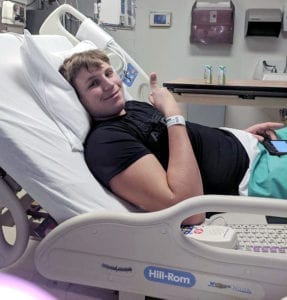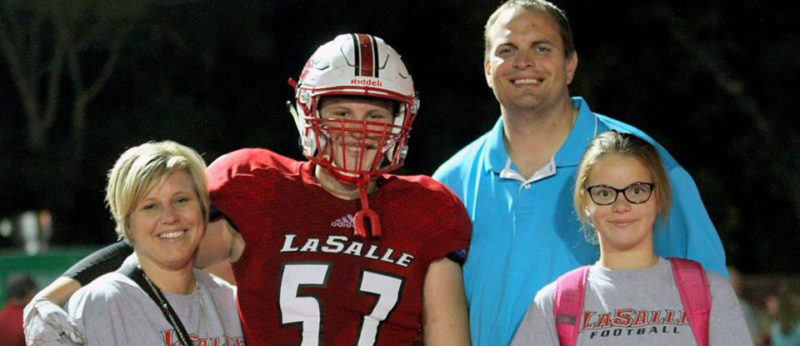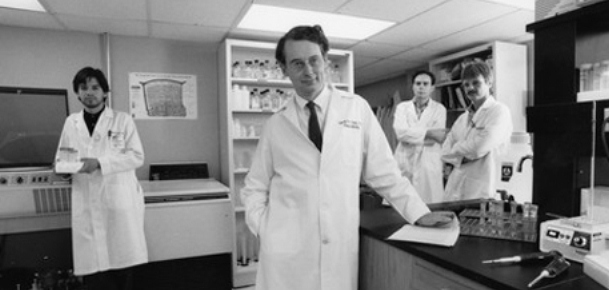My son, Gavin, woke up one morning during Winter break 2015 looking like a chipmunk. His eyes were swollen shut. His lips were three times their normal size. Lymph nodes on his chin and neck were enlarged. He had lesions inside of his mouth. We had no idea what was going on, but we quickly made our way to Cincinnati Children’s.
Naturally, we suspected that Gavin was having an allergic reaction, but he was not. In fact, it took three long years before we received a diagnosis of Melkersson-Rosenthal syndrome. This is a rare neurological disorder, which happens in about 8 in 10,000 people.
Because his diagnosis took a long time and required a lot of persistence to unveil, I’d like to share our family’s experience in hopes that we might be able to help another family avoid a similar lengthy diagnosis.
5 Things To Know About Melkersson-Rosenthal Syndrome
1. What It Looks Like
Gavin’s experience was pretty typical of what they know about the condition. He had four of the five diagnostic features. Swelling of face, eyes and lips. Recurrent facial numbness. Swollen lymph nodes. Painful lesions on his face. The only aspect he did not experience was Crohn’s disease.
When present, the facial lesions look like herpes, as they are pus-like blisters that eventually open and scab. These lesions can manifest in the hairline, on the face, arms and/or legs. Ultimately, a biopsy of his lesions pointed us to the diagnosis, as it contained granulomatous tissue.
2. How We’re Treating the Symptoms
Once Gavin received a diagnosis, treatment with rheumatology was the next step in the process. It took some trial and error to find the right mix of medications to control his symptoms. Throughout Gavin’s treatment, we found that some drugs were not covered by our insurance, so we had to navigate that world to begin the necessary treatments.
Once on the treatments, we discovered Gavin was resistant to some pill forms of medications. Therefore, he had to receive IV or injections instead. Today, he is on a weekly regimen of Methotrexate (chemotherapy and immunosuppressant), monthly Methylprednisolone (steroid) and Remicade (immunosuppressant) infusion, and many daily medications to keep his immune system strong and healthy. For now, the combination of drugs is working, but they will have to continually be monitored and adjusted as he continues to grow.
3. With Treatment, It’s Been Manageable
As a parent it can be frustrating to simply treat your child’s symptoms and not cure it. But to be where we are today compared to three years ago, we are counting our blessings. After finding the right treatment formula, Gavin is a happy, healthy child, successful student, and stellar athlete who gets to work every day toward his dream of playing football for a Division I school. At this time, we have no reason to believe that his condition will prevent him from doing anything his heart desires in life.
4. Timing of Medications
With any autoimmune disease or illness comes the potential for exhaustion and additional downtime to recover. For Gavin, we have discovered that the mix of medications makes him pretty tired, but only for a day or so. Therefore, we have been able to create a schedule that allows him to take his medications and infusions on Saturday nights so that he has Sundays to recover and relax. This has allowed him to maximize his strength and potential at school and on the football field each week, without having to take time off.
5. The Importance of Being An Advocate
Parents are natural advocates for their children. It was particularly important for us to continue to push for answers, because no one knew what was going on with Gavin since his symptoms were unique and the condition is rare. During our initial days of searching for answers, we saw countless specialists. It was a second opinion that did eventually lead us down the path to a diagnosis and ultimately, it was rheumatology who got us started on the treatments Gavin needed.
Our rheumatologist, Dr. Ting, has only seen one other case like Gavin. We continue to work together as a team to figure out what works best for him. As a parent, it is important to always follow your gut instinct and do your homework. Also, do not be afraid to ask for help or for other doctors to consult on your case. You never know what someone else might add to your situation.
Ultimately, we hope that Gavin will grow out of Melkersson-Rosenthal syndrome. Or, at the very least, that the regimen he’s currently on will continue to work as-is. For now, Gavin is staying focused in school and on the football field, and as parents, we will continue to push for answers and spread awareness for this condition.
To learn more about our division of Rheumatology, please call 513-636-4676 or visit our webpage.




Hello-
This blog has been very helpful. My sister in law was diagnosed with this about four months ago after and hasn’t had any luck with relieving the constant pain she is in. She lives in the Bay area in California and every specialist she has seen seems to know nothing about this condition. Do you have any suggestions of any doctors that I could put her in contact with? She is in desperate need of help.
Thank you,
Raquel